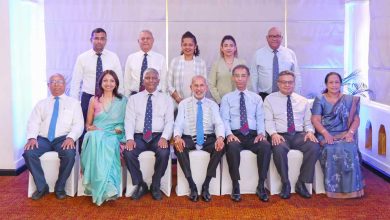WORLD BANK
The Impact of Temperature and Precipitation Changes on Living Standards
Speech by Andrew Goodland at the South Asia Hotspot Launch
Good morning ladies and gentlemen, distinguished guests and colleagues. On behalf of the World Bank I warmly welcome you today to this event which discusses a topic that influences all of us in one way or another.
Every day, we read stories of communities around the world being hit by droughts, floods, intense weather related natural disasters, and rising sea-levels.
In Sri Lanka this year, floods have affected 19 districts, killing people, and impacting lives of more than 150,000 people. Drought conditions have also affected a large part of the country, devastating agriculture production and water supply. This is the third year in a row that we are facing such devastating effects and demonstrate that this is the new normal for Sri Lanka. Climate impacts have become a daily reality for millions and threaten our efforts to end poverty and build a more prosperous world.
The purpose of today’s discussion is to understand better who is affected by these events and what the solutions are to address the adverse impacts of these events.
These weather events have one thing in common: They affect the lives of the poorest and most vulnerable the most. We need to both scale up actions and strategies to build a more resilient world, and target interventions to help the most vulnerable.
How do we achieve that?
It will require commitment and funding from all partners. It will also require increased knowledge and understanding of risks and impacts to identify appropriate responses. At the World Bank Group, we are working with other development partners and governments on innovative solutions to help countries meet their climate commitments.
In the last year, the World Bank Group delivered $20.5 billion in climate-related financing, which accounts for 32 percent of the World Bank’s total lending.
Now, all our projects must undergo a climate risk screening to ensure adaptive actions are mainstreamed in the operations.
In Sri Lanka, the World Bank is working closely with the Government to support climate resilience and adaptation to climate change.
Under the Climate Resilience Improvement Project, we are supporting major investments to improve flood protection and resilience to landslides.
We had one of first CAT DDO operations in the region. This is a financing mechanism to respond fast to emergencies.
The proposed Climate Smart Irrigated Agriculture Project is scheduled for approval this year and will support improved water management for agriculture including the rehabilitation of irrigation systems in identified hotspot areas of the country.
Our Social Protection team is supporting the Government’s efforts to protect the poor and the vulnerable from impacts of disasters. Next week this area will be explored further at a conference on Adaptive Social Protection which explores how the current system of social protection can be used to improve disaster response.
Finally, we are working with government to support improved disaster risk financing, including insurance.
Today, we will present new research that measures the projected impact of weather changes on South Asian communities and identifies strategies to improve their resilience.
The “South Asia’s Hotspots” report analyzes how rising temperatures and changing precipitation patterns are –-and will continue – to affect living standards across South Asia.
The research builds on Bank’s earlier studies that examined the damaging effects of climate change on the health and well-being of populations, especially the poorest.
What’s unique about this report is how it identifies specific vulnerable areas called climate “hotspots” and suggests coping solutions to improve resilience.
The report provides the data and climate simulations to help the region put in place incentives, policies, and smart solutions to protect communities across South Asia and boost their future development.
I hope you find this a stimulating and valuable report and I look forward to an engaging discussion today.
Thank you






